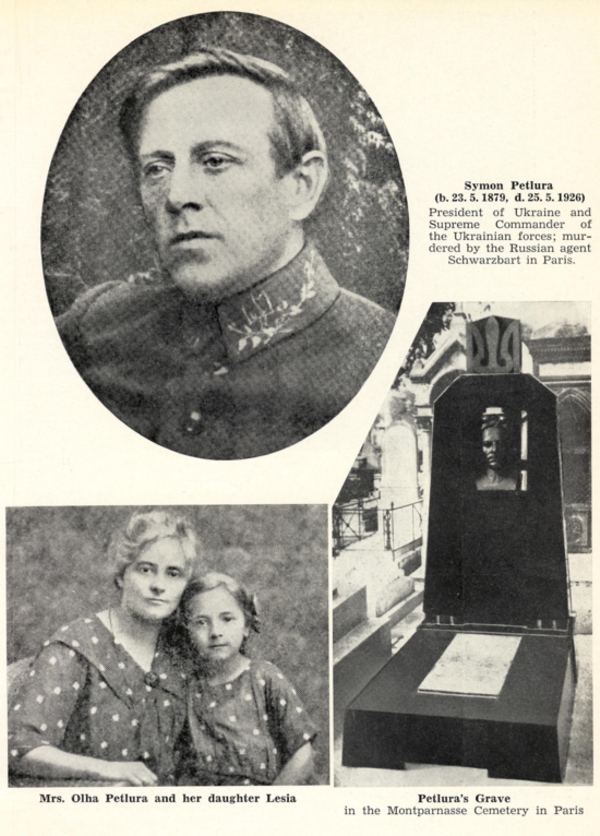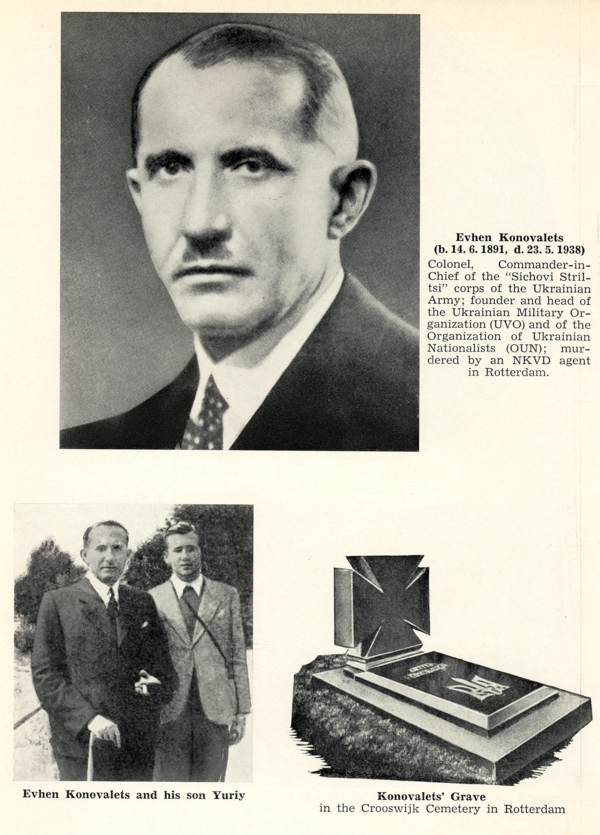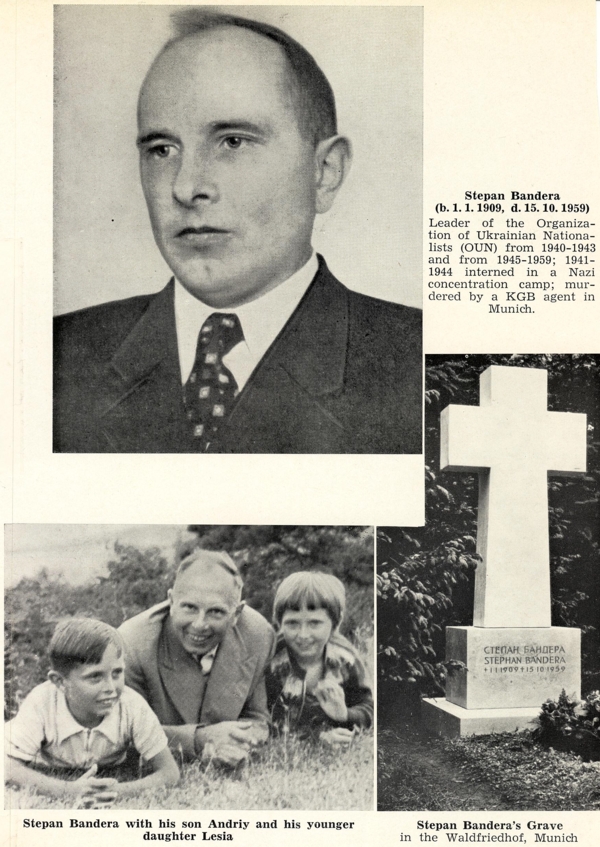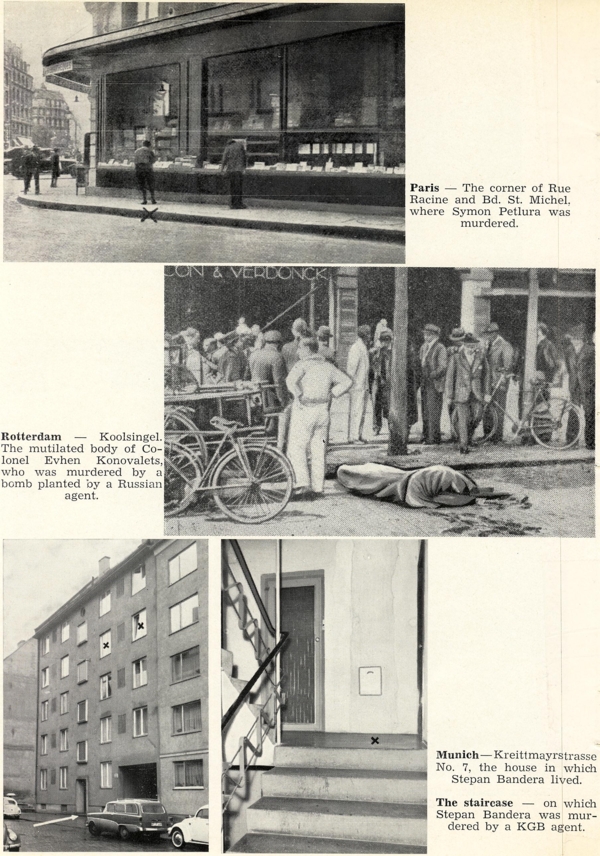
Yushchenko
 Yushchenko |
 Petlura |
 Konovalets |
 Rebet |
 Bandera |
In Defense Of Keeping History Alive
In relation to every people that it has ever ruled, the Kremlin has played the role of slave master: Albanians, Bulgarians, Czechs, Estonians, Georgians, Hungarians, Latvians, Lithuanians, Poles, Romanians, Slovaks, Ukrainians. The Kremlin oppressed and exploited all these people, smothered their language and culture, decimated their intelligentsia, and butchered their leaders. All these people execrated Russian rule, yearned to be free, and just as soon as the opportunity presented itself, seized emancipation. Never have a people proven themselves as unfit to rule over others as have Russians. Never has a collapse of empire been more inevitable and more deserved.
Had the Kremlin ever repented and reformed, then its historical crimes might best be left for historians to catalog, but not kept before the public eye where they would block the normalization of relations. But how can the Kremlin reform? The Kremlin is a reflection of thousand-year-old Russian culture, loathsome to every Westerner who discovers it, as it was loathsome to American astronaut C. Michael Foale who immersed himself in it in Star City, the spaceflight center outside Moscow, in 1995:
Foale soon became known as the most Russianized of the Americans. The more Foale learned about Russian culture, however, the more he loathed it, at least the old Soviet power structure. "I hate — absolutely hate — the Russian Communist culture of male power and control," he says today. "This doesn't go back 80 years, to the revolution. This goes back thousands of years. It's the same culture, of a Russian male oligarchy. Their culture hasn't changed. It's just evolved. It's a handful of powerful men controlling everything." Brian Burroughs, Dragonfly: NASA and the Crisis Aboard Mir in Letter From Space: All Heaven in a Rage, Vanity Fair, November 1998, p. 132. |
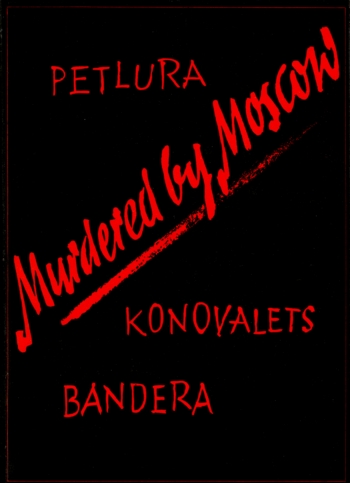 Murdered by Moscow in pdf format |
During the past forty years three leaders of the Ukrainian national fight for
freedom have been the victims of political murder by Communist
Moscow. Stepan Lenkavsky, Soviet Russian Political Murders Abroad and Attempts to Camouflage Them, in Murdered by Moscow: Petlura—Konovalets—Bandera, Three leaders of the Ukrainian National Liberation Movement assassinated at the orders of Stalin and Khrushchov, Ukrainian Publishers Limited, London, 1962, p. 5. |
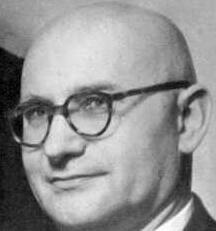 Lev (Leo) Rebet |
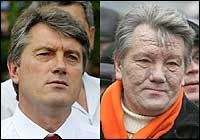 Viktor Yushchenko (left) as he appeared in July 2004 and (right) as he appeared in November after the alleged poisoning (Gleb Garanich / Vasily Fedosenko / Reuters). Photos and caption originally from Wikipedia at en.wikipedia.org/wiki/Viktor_Yushchenko |
The statement by "eleven highly qualified Austrian doctors" that Yushchenko had "acute pancreatitis accompanied by
interstitial edematous changes" (Interfax-Ukraine, September 17) is a summary of symptoms, not an identification of what caused those symptoms. Three categories of cause come to mind. First, a chemical agent, in which case a positive diagnosis might be the discovery of that chemical in Yushchenko's body, followed by an announcement of the name of that chemical. Second, a biological agent, as perhaps a virus, a bacterium, or a parasite, which would be identified in a laboratory test, even photographed, and again specifically named. Third, a genetic anomaly, which again would be named and demonstrated in DNA charts, and with an explanation of why the genetic irregularity had not affected Yushchenko during the first five decades of his life.
Oleksandr Zinchenko, head of Yushchenko's campaign, stating that Yushchenko's illness was "due to a serious viral infection and chemical
substances which are not normally found in food products," (Reuters, September 17) is moving in the right direction, but unless the virus and the chemicals are named, and the means of their identification is disclosed, such a statement constitutes not a diagnosis, but an indication of the categories in which the diagnosis is thought to lie.
The diagnosis that is missing, then, is what exactly it is that could be done to any healthy person picked at random which would produce the same changes as have been observed in Viktor Yushchenko. Feed him what chemical? Infect him with what virus? Do exactly what to him so as to trigger the observed "acute pancreatitis accompanied by interstitial edematous changes"?
Have The Perpetrators Reached Equilibrium?
Reading the following in Murdered by Moscow concerning Bohdan Stashynsky, the assassin of Stepan Bandera (forgetting Lev Rebet for the moment), raises another thought: "Stashynsky has since defected to the West, in August, 1961, and confessed to the murder, for he feared that his masters would try to wipe out the traces of the crime by liquidating him, too" (p. 3). That other thought is that every assassin is aware that he can escape liquidation by whistleblowing, and that everyone who hires an assassin is aware that he can prevent whistleblowing by liquidation. Whoever acts first wins, whoever hesitates is lost. The situation is highly unstable, but readily reaches equilibrium through whistleblowing or through liquidation. We may expect, then, that if there exists a poisoner of Viktor Yushchenko, he has by now either been liquidated, or verges on blowing the whistle.
An Unacknowledged Reason Why The Kremlin Needs To Control Ukraine
Anyone acquainted with the Kremlin compulsion to kill Ukrainians will notice when he hears listings of reasons why Russia is motivated to control Ukraine that the listings are always incomplete. One ever-absent reason is that Ukraine accomodates a prize collection of mass graves holding the bodies of Ukrainians killed on Kremlin command, graves which sometimes contain hundreds of bodies, sometimes thousands. As ten thousand victims have been discovered in Vinnytsia, the future discovery of tens of thousands is not an impossibility. These graves are imperishable evidence of Kremlin malevolence, and in a free Ukraine, that evidence will in due course be unearthed and published, and the Kremlin will be held to account. One reason the Kremlin is desperate to hold on to Ukraine, then, is to prevent the evidence of Kremlin butchery from being exhumed. A hand must be forever kept over the victim's mouth to prevent him from crying out.
The Path To Slavic Unity
The only path which can lead to Slavic cooperation, and to Russia being accepted by the civilized world, is for the Kremlin to confess its crimes. Start by disclosing everything that the Kremlin knows about Petlura-Konovalets-Rebet-Bandera, and about Yushchenko.
Disclose whether Our Ukraine parliamentary deputy Oleh Oleksenko was killed in 2002 using the same agent as was recently used on Yushchenko www.taraskuzio.net/elections2004/assasination_yushchenko.pdf. Start, too, by disclosing everything that the Kremlin knows about the falsification of the 2004 presidential election in Ukraine. Disclose all that the Kremlin knows about the hanging of poet and composer Volodymyr Ivasiuk, and about the beheading of Internet journalist Heorhy Gongadze, and so on, and so on.
If two Ukrainians are known to have been assassinated outside Ukraine by means of the cyanide pistol, then how many more might have been assassinated by means of the same cyanide pistol inside Ukraine, and their deaths attributed to heart failure? The same question is broached on the pages of Murdered by Moscow: "But who can guarantee whether the poison pistol invented by the MVD, the existence of which has now by chance become known in the West, is not being turned out in serial production and being used on a large-scale in the Soviet Union, too, against persons whom Moscow considers to be a political danger?" (p. 20). Confess such domestic cyanide-pistol assassinations too, all of them, whether there be hundreds of them, or thousands, or tens of thousands.
Identify all assassins, all torturers, all who signed orders for assassination and torture. Confess and apologize and make reparation for everything! That being done, the doors to forgiveness and reconciliation and cooperation will be thrown wide open. In the absence of confession and repentance, only bitterness and resentment and suspicion are possible. Confession and repentance are evidence that crime has been renounced, and would make the hypothesis that the Kremlin poisoned Yushchenko less plausible. Conversely, the refusal to confess is evidence that crime continues to be embraced, and makes the hypothesis that the Kremlin poisoned Yushchenko more plausible. If the Kremlin wishes to avoid being suspected of murder or attempted murder, it must murder less, and it must repent more.
But confession is not habitual for the Kremlin. The Kremlin's standard code of conduct is expressed in Murder by Moscow as follows: "The Russians have one inalterable principle: Moscow was never guilty and is never guilty of crime" (p. 8). As long as Moscow follows in this tradition, the Ukrainian people ask you to please stop annoying them, as they will not collaborate with you beyond trading with you as they would with a stranger whom they distrust. If your best overture to Ukraine is to stonewall, then sit you behind your Kremlin walls and wonder at the mystery of why the Kremlin is universally hated and why the Russian empire disintegrates, the mystery of why those who emancipate are embraced and those who enslave are repulsed, the mystery of why those who submit to law are trusted and those who wade in carnage are feared. Leave Ukrainians free to govern their own affairs for a while, with the aim of testing the hypothesis that all their misfortunes originate from Moscow, and that once freed from the Kremlin's stranglehold, they can begin to prosper.
Ukraine Compared To Israel
Israelis would never tolerate being governed from Berlin, even though today's Germans have acknowledged WW II guilt, have renounced Nazism, and have made reparations. If a still-Nazi Reichstag attempted to rule Israel, one can imagine it would encounter some resistance. It is exactly this sort of resistance that the still-Soviet Kremlin encounters in attempting to rule Ukraine. Even after Moscow acknowledges its genocide, renounces enslavement, and makes reparations, Ukraine still will reject its rule. In the absence of such a Kremlin change of direction, its attempt to rule Ukraine is symptomatic of deranged arrogance, and portends Russia's continuing decline.
Lubomyr Prytulak
